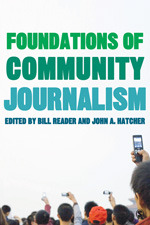
Foundations of Community Journalism
- Bill Reader - Ohio University, USA
- John A. Hatcher - University of Minnesota Duluth, USA
With chapters written by established journalism academics and teachers, the book provides students and researchers with an understanding of the multiple and interdisciplinary approaches to the study of community journalism, with what community journalism is as a research concept, and with a range of different methods and theories that can be applied to community journalism research.
While there are numerous 'how-to' community journalism manuals for students and newspaper editors, none contains the focus on how to conduct research into community journalism - a focus needed in this era of accountability.
This book has been needed for so long [and will make] a tremendous contribution. Community journalism and journalism’s relation to communities and community formation, maintenance and destruction has never been as relevant as now, yet there is not one source that provides an adequate overview of research and a synthesis of the most relevant content in the area. [This book] promises to be a widely cited foundation work in the area…I’ve waited years for a book like this.
Clearly, the best book in the field.





